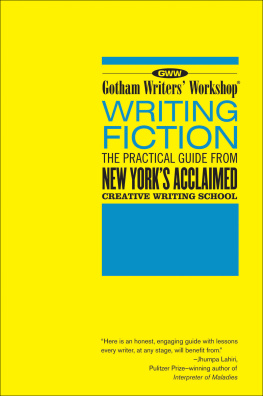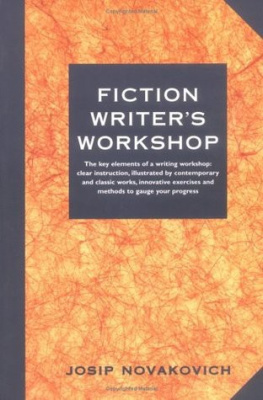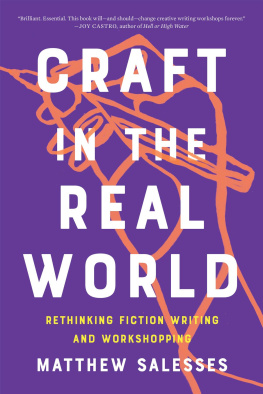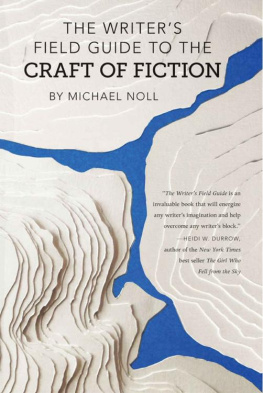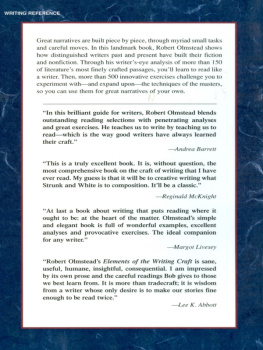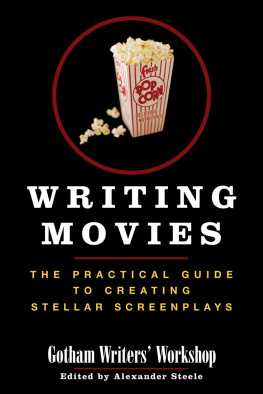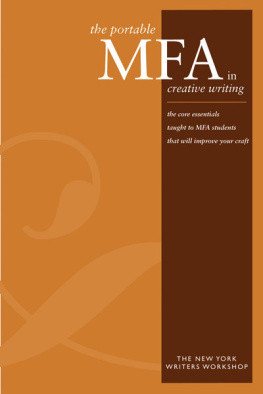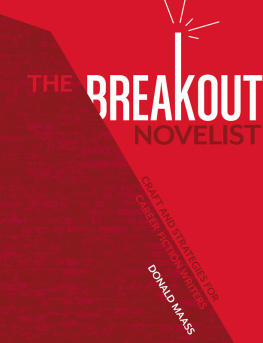
Gotham Writers Workshop
WRITING FICTION
THE PRACTICAL GUIDE FROM NEW YORKS ACCLAIMED CREATIVE WRITING SCHOOL
WRITTEN BY GOTHAM WRITERS WORKSHOP FACULTY EDITED BY ALEXANDER STEELE
B L O O M S B U R Y
NEW YORK BERLIN LONDON
FROM GOTHAM WRITERS WORKSHOPS FOUNDERS
Gotham Writers Workshop began with a single class taught in a living room on the Upper West Side of New York City. The class was free. After three hours, everyone had a choice. They could leave, or, if they felt they had learned something worthwhile, they could pay for the rest of the course. Everyone decided to stay, and the first semester at Gotham Writers Workshop had begun.
Those original students spread the word. So we offered more classes. Word of mouth traveled wider. We hired teachers, rented an office. Soon we were teaching classes in various locations throughout New York City. Eventually we expanded into online classes, and we drew students from all over the world. Today we employ over a hundred instructors who teach more than six thousand students a year.
Despite our growth, we still think of ourselves as a grassroots organization. Class size remains small enough to fit into a New York living room. Our teachers continue to bring their passion for writing to every class. Our founding principles are unchanged.
Simply put, we believe anyone can write. We believe writing is a craft that can be taught. True, talent cannot be taught, only nurtured, but the craft of writing can be taught. Were devoted to teaching the craft in a way that is so clear, direct, and applicable that our students begin growing as writers during their very first class.
Theres no easy formula for creating great fiction, but a fundamental knowledge of writing craft is, more than anything, what will allow your talent to blossom on the page. Such knowledge is what we offered in that first class, and its what our teacherswho are all writing and teaching professionalscontinue to offer every one of our students.
Now weve put the Gotham style of teaching into a book. The ability to writeto write with excellenceis in your hands.
Jeff Fligelman and David Grae February 2003
HOW TO USE THIS BOOK
You shouldnt just read your way through this book, but write your way through it as well. After all, youre reading this book because you want to write.
Sprinkled throughout every chapter, youll find numerous writing exercises, indicated by the words Your Turn. Quite literally, this means its your turn to apply the knowledge youve just learned to your own writing. You shouldnt worry about turning these exercises into brilliant works of fiction. Rather, you should simply focus on experimenting and having fun with the task at hand. If one of the exercises spawns a wonderful idea that you would like to expand into a longer piece of writing, a piece you hope to finish and perhaps publish, by all means help yourself. In fact, toward the end of the book youll be advised to do just that.
You also might find it useful to keep your work on these exercises in a notebook, either the paper kind or the computer kind. If you do all or most of the exercises in this bookand you shouldyoull have a wide resource of ideas and fragments from which to draw or be inspired the next time youre looking for a fiction project.
Not that we want to make things too easy for you, but at the back of this book you will find a cheat sheet that gives you a checklist of many of the key points on writing craft that appear in this book. You may want to keep the cheat sheet handy when writing your next work of fiction.
You will also find numerous passages from works of fiction cited throughout this book. If one or more of these works looks interesting to you, you should get your hands on a copy and read it. If the work is a novel or novella the title will appear in italics, and if the work is a short story the title will appear in quotes. A number of the short stories that appear in this book can be found in The Vintage Book of Contemporary American Short Stories, edited by Tobias Wolff.
In particular, you should read the short story Cathedral by Raymond Carver, preferably in tandem with reading this book. Cathedral is referred to repeatedly throughout this book, and having read the story will enhance your understanding of these references. You will find Cathedral reprinted in its entirety in the Appendix.
Last, youll find additional information on the art and business of writing at the Gotham Writers Workshop Web site: www.writingclasses.com.
CONTENTS
CHAPTER 1
FICTION: THE WHAT, HOW, AND WHY OF IT
BY ALEXANDER STEELE
CHAPTER 2
CHARACTER: CASTING SHADOWS
BY BRANDI REISSENWEBER
CHAPTER 3
PLOT: A QUESTION OF FOCUS
BY DAVID HARRIS EBENBACH
CHAPTER 4
POINT OF VIEW: THE COMPLETE MENU
BY VALERIE VOGRIN
CHAPTER 5
DESCRIPTION: TO PICTURE IN WORDS
BY CHRIS LOMBARDI
CHAPTER 6
DIALOGUE: TALKING IT UP
BY ALLISON AMEND
CHAPTER 7
SETTING AND PACING: IM HERE THEREFORE I AM
BY CAREN GUSSOFF
CHAPTER 8
VOICE: THE SOUND OF A STORY
BY HARDY GRIFFIN
CHAPTER 9
THEME: SO WHATS YOUR STORY REALLY ABOUT?
BY TERRY BAIN
CHAPTER 10
REVISION: REAL WRITERS REVISE
BY PETER SELGIN
CHAPTER 11
THE BUSINESS OF WRITING: DRIVING YOURSELF NUTS FOR FUN AND PROFIT
BY CORENE LEMAITRE
BY RAYMOND CARVER
CHAPTER 1
FICTION: THE WHAT, HOW, AND WHY OF IT
BY ALEXANDER STEELE
Hello, you look familiar.
As the dean of faculty at Gotham Writers Workshop, Im surrounded by people with a desire to create fiction. On a daily basis I work with our fiction teachers, folks so talented and intelligent they could have made a killing in most any field, but instead have opted to pursue the precarious life of a fiction writer. Frequently I observe our fiction classes, some in regular classrooms filled with students from New York City and the surrounding areas, some in cyberspace classrooms, filled with students from all over the United States, and from as far away as Africa, China, and Australia. I see the whole wide world in these classesdoctors, lawyers, accountants, janitors, policemen, undertakers, housewives, retirees, students, psychics, zookeepers, and everything else.
Its a fact: a staggering number of people out there harbor an intense desire to create fiction.
Why?
Though this chapter will cover more than a philosophical inquiry into why we write fictionas the title promiseslet me see if I can find an answer to this vexing question, preferably by the chapters end.
A BRIEF DEFINITION OF FICTION
Lets start with a simpler question: what is fiction? In the broadest sense, fiction is simply a made-up story.
The business of making up stories has been going on for a long time. Somewhere in the shadowy past, our cave-dwelling ancestors began conjuring stories and telling them to each other. The tradition grew, and some of these stories eventually attained the best-seller status of myths, tales destined to be passed on through generations and to migrate across continents and to shape the way people thought. At some point, some of these stories started to get written down with the intention that they would be read. An enterprising Mesopotamian writer chiseled The Epic of Gilgamesh into stone tablets some four thousand years ago, and if you think revision was difficult on a typewriter
Anyway, this brings us to the more narrow definition of fiction: a made-up story told in prose with words alone.
Next page
